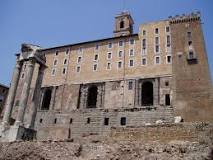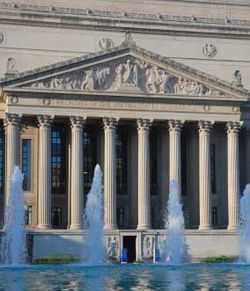Public religion: Difference between revisions
No edit summary |
|||
| Line 1: | Line 1: | ||
[[Image:Tabularium.jpg|right|thumb|250px|Tabularium]] | |||
Public religion can refer to both a ''civic faith'' within a government control and to ''public'' expressions of that faith in cultures where religion is often considered more a private affair. | Public religion can refer to both a ''civic faith'' within a government control and to ''public'' expressions of that faith in cultures where religion is often considered more a private affair. | ||
Public affairs included benefits and the collection of the funds to provide those benefits. That meant records of members and who has paid in and what is paid out. | |||
Members received entitlements in the form of gifts and gratuities but also had a civic obligation of support. Under the [[Public religion]] of the Rome Augustus became the ''pontifex maximus'' (chief priest). From that point on the Emperor of Rome provided the social welfare run through the state temples in a form of Public religion. | |||
This practice increased the power of the state and the dependence of the people. Social welfare was managed through their [[Temples|temples]] like Ephesus, Temple of Saturn and the Parthenon. Saturn was the god of agriculture which housed the records needed by the government and beneficiaries of its systems of welfare including birth certificate. | |||
[[Image:Archives.jpg|right|thumb|250px|The modern Tabularium (NARA)at the Capitol in Washington, D.C. entry is by way of Constitution Ave.]] | |||
The first building for maintaining public records in Rome, including the law, | |||
was erected under the protection of the temple of Saturn, as early as 509 B.C. but was possibly burned by the Gauls in 309 B.C. Other buildings were used until 78 B.C. when they built the great Tabularium, on Capitoline Hill, below the [[Temples|Temple]] of Jupiter, which was the symbol of the sovereignty and power of Rome. | |||
Civic faith includes an aspect of civic allegiance and depends upon [[Civil law]] to impose both. It includes both a civic duty and benefit. Private religion | Civic faith includes an aspect of civic allegiance and depends upon [[Civil law]] to impose both. It includes both a civic duty and benefit. Private religion | ||
The 2nd century A.D. text 'De Significatione Verborum' of Sextus Pompeius Festusgives distinguishes public and private religion. The former is carried out at public expense either on behalf of the populus as a whole or individual members of the populus who met certain criteria. Private individuals could contribute to the temples and festivals which at one time depended entirely upon donation by the people for the people. | The 2nd century A.D. text 'De Significatione Verborum' of Sextus Pompeius Festusgives distinguishes public and private religion. The former is carried out at public expense either on behalf of the populus as a whole or individual members of the populus who met certain criteria. Private individuals could contribute to the temples and festivals which at one time depended entirely upon donation by the people for the people. | ||
| Line 40: | Line 50: | ||
As such, the terms Public or Civil religion serves to refer to one side while Private religion through the Church or other charitable institutions form the familiar private-public dichotomy. | As such, the terms Public or Civil religion serves to refer to one side while Private religion through the Church or other charitable institutions form the familiar private-public dichotomy. | ||
Public religion centralizes power in the hands of the state an debilitates the fibrous nature of a virtuous society. | Public religion centralizes power in the hands of the state an debilitates the fibrous nature of a virtuous society. | ||
Revision as of 16:01, 23 February 2014

Public religion can refer to both a civic faith within a government control and to public expressions of that faith in cultures where religion is often considered more a private affair.
Public affairs included benefits and the collection of the funds to provide those benefits. That meant records of members and who has paid in and what is paid out.
Members received entitlements in the form of gifts and gratuities but also had a civic obligation of support. Under the Public religion of the Rome Augustus became the pontifex maximus (chief priest). From that point on the Emperor of Rome provided the social welfare run through the state temples in a form of Public religion.
This practice increased the power of the state and the dependence of the people. Social welfare was managed through their temples like Ephesus, Temple of Saturn and the Parthenon. Saturn was the god of agriculture which housed the records needed by the government and beneficiaries of its systems of welfare including birth certificate.

The first building for maintaining public records in Rome, including the law, was erected under the protection of the temple of Saturn, as early as 509 B.C. but was possibly burned by the Gauls in 309 B.C. Other buildings were used until 78 B.C. when they built the great Tabularium, on Capitoline Hill, below the Temple of Jupiter, which was the symbol of the sovereignty and power of Rome. Civic faith includes an aspect of civic allegiance and depends upon Civil law to impose both. It includes both a civic duty and benefit. Private religion
The 2nd century A.D. text 'De Significatione Verborum' of Sextus Pompeius Festusgives distinguishes public and private religion. The former is carried out at public expense either on behalf of the populus as a whole or individual members of the populus who met certain criteria. Private individuals could contribute to the temples and festivals which at one time depended entirely upon donation by the people for the people.
The later called Private religion was almost always on the behalf of individuals, familiae and gentes. These Family groups gathered in a network of hearths in early Rome and were served by chosen individuals who connected these groups from a grass roots union of voluntary loyalty and honor in charity to their fellow man.
Later this practice of private religion through free will sharing according to what the individual believed that the gods or God wanted them to do began to become more controlled. First certain groups like collegiae, guilds and sodalities provided for their own but then temples became more enterprising and collective. Eventually with the centralization of power in government, first in the Senate and then in an Emperor and Principas Civitas, private religion became less essential in forming the bonds of society and Public religion through the civil authorities and registration of citizens began to dominate public services altering the very nature of society.
Civic faith more recently was expressed by men like Benjamin Franklin who in 1749 proposed an educational academy in Philadelphia. He believed that the study of history would "afford frequent Opportunities of showing the Necessity of a Publick Religion ," arguing "from its Usefulness to the Publick; the Advantages of a Religious Character among private Persons." But undoubtedly Ben was including the moral charcter required in the performance of religion and that it should be incorporated in public affairs.
Religion was at that time chiefly the performance of your duty to God and your fellowman and not merely your opinion of who God is.
Civil Religion is mentioned in the Social Contract[1] by Jean-Jacques Rousseau who switched from protestant to Catholic and back again depending on which women he was in love with at the time. He suggested that a Christian Republic was paradoxical imagining that Christianity taught submission. He knew that it did not promote participation in public religion.
In Gibbon’s Decline and Fall of the Roman Empire, he praised “the union and discipline of the Christian republic.” He also pointed out that “it gradually formed an independent and increasing state in the heart of the Roman Empire.”Rousseau and Revolution, Will et Ariel Durant p.801. fn 83 Heiseler, 85.
The bloody conflict between the religions of the fifteenth through the seventeenth century focused the attention and imagination of men on the ideology of religion and opinions about God leaving off the weightier matter of the performance of your duty to your fellowman with righteous intent. The idea of a theocracy still strikes fear in the hearts of men.
Émile Durkheim, struck many as representing a kind of "top-down" governmental development. Avoiding the supernatural or even God all together Durkheim defined religion as:
- "A religion is a unified system of beliefs and practices relative to sacred things, i.e., things set apart and forbidden--beliefs and practices which unite in one single moral community called a Church, all those who adhere to them." [2]
Of course Émile, as a sociologist, was in his head a lot about things like religion imagining that they were what you think rather than your performance of a duty. He was not only a French sociologist, social psychologist and philosopher but is considered to be the architect of modern social science and father of sociology and friendly with the ideologies of Karl Marx and Max Weber.
While there is always an element of what you think in religion being a doer of the word is clearly the emphasis of Christ and his followers until this modern era. This is not to say that doing was the matter of a tally sheet of good deeds that earned you the blessings of God but that your private faith compelled your actions to seek righteous deeds at every turn and opportunity.
The early Christian ekklesia or called out Church was a republic that was recognized by Rome through the proclamation nailed to the cross by order of the Proconsul of Rome, Pontius Pilate. When Jesus rose from the dead to stand again upon the earth, so did His Kingdom. His kingdom now lives in the hearts of those who follow His way.
Men like John Wilson of Princeton see "public religion" as alternate form to the weaker "civil religion" but were both top down. Franklin view of public religion was "from-the-bottom-up"having been heavily influenced by the rugged individualism of the frontier and the distaste for exercising authority from the top.
Franklin many other founders more moral in their lives were simply advocating a need for public morality and virtue knowing full well that without theme the U.S. Constitution would be ineffective for republican life it was to protect. They new that despite the denominational and sectarian form their religious philosophies and eschatology took that there was common good and moral character to their teachings. But more important was their endeavor to aid one another in charitable service performed public religion by voluntary acts of citizens rather than the top down authority of civil controls.
Public religion, first has the aspect of the performance of duty to man according to a righteous spirit of the divine dwelling in the individual, and secondly, refers to expressions of religious faith by that behavior generated by private individuals through free assemblies within communities. There is almost always a voluntary sector having direct bearings on public order.
The Church, as one form of government, provides public service as Benefactors without exercising authority over the people while both political and civil practices of religion involve compelled offerings directed by the states and extracted from the people from the top down.
As such, the terms Public or Civil religion serves to refer to one side while Private religion through the Church or other charitable institutions form the familiar private-public dichotomy.
Public religion centralizes power in the hands of the state an debilitates the fibrous nature of a virtuous society.
See Christians_conflict#Public_and_Private_Religion